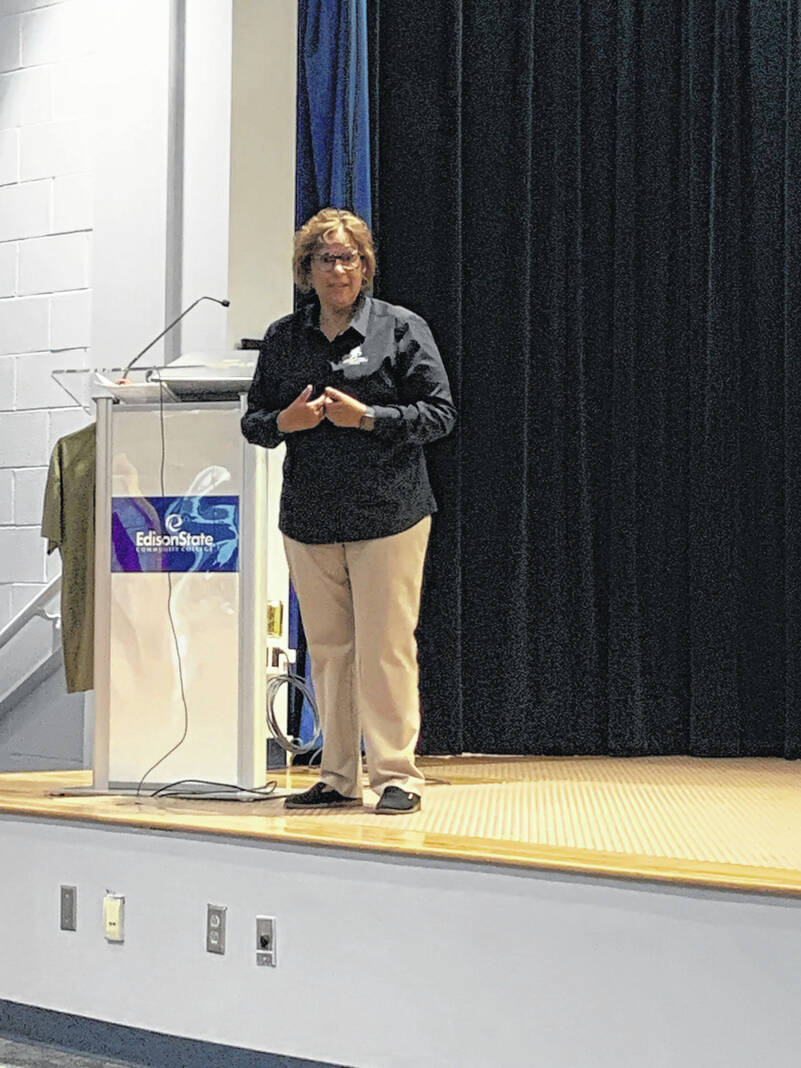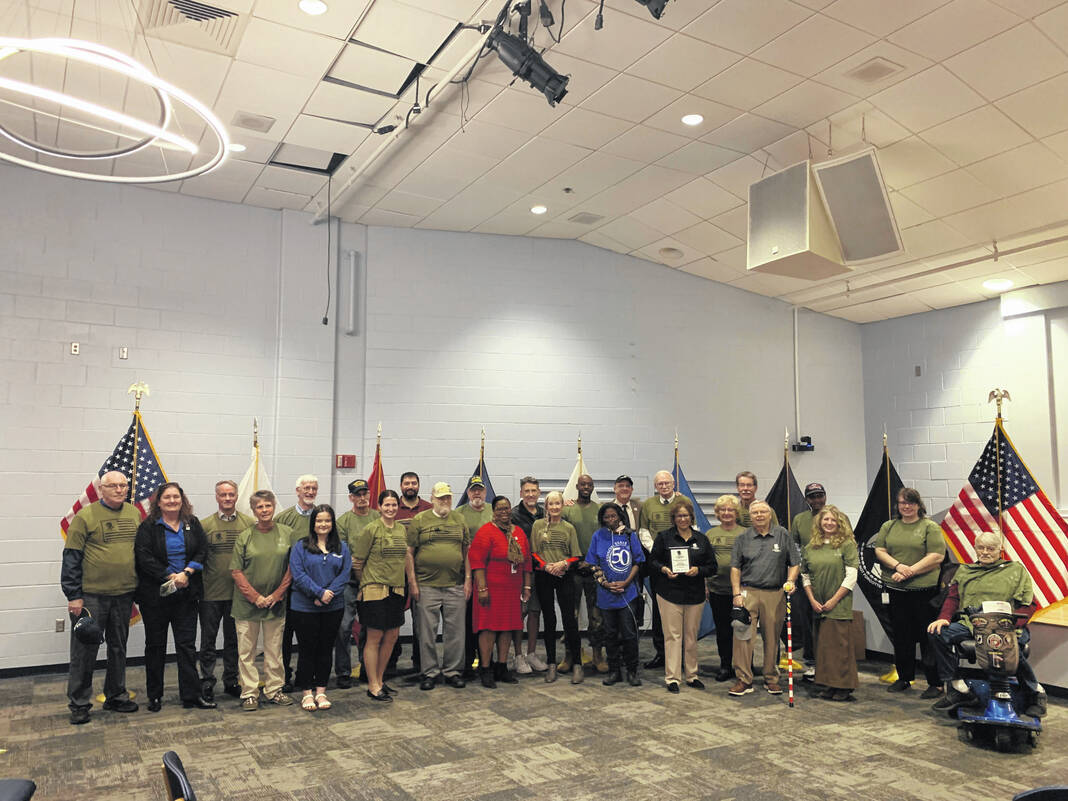
Wounded Warrior Project Speaker Cindy Parsons tells her story to the crowd at Edison State Community College on Nov. 8. The Diversity Committee at Edison hosted Parsons as part of National Veterans and Military Families Month.

Edison State Community College student and Vietnam veteran Tom Hemmelgarn, left, presents Wounded Warrior Project Speaker Cindy Parsons with a plaque at an Edison event featuring Parsons and her story on Nov. 8. Hemmelgarn asked Parsons to speak at the college after he heard her speak previously. The Diversity Committee at Edison hosted Parsons as part of National Veterans and Military Families Month.

Wounded Warrior Project Speaker Cindy Parsons, holding a plaque, poses with attendees of her presentation at Edison State Community College on Nov. 8. The Diversity Committee at Edison hosted Parsons as part of National Veterans and Military Families Month.

Edison State Community College unveiled a plaque commemorating men and women who have served in the military and then completed their education at Edison after Wounded Warrior Project Speaker Cindy Parsons told her story on Nov. 8. The Diversity Committee at Edison hosted Parsons as part of National Veterans and Military Families Month.
By Charlotte Caldwell
PIQUA — As part of National Veterans and Military Families Month, the Diversity Committee at Edison State Community College hosted Wounded Warrior Project Speaker Cindy Parsons on Nov. 8 to talk about her experience with her veteran son who was injured in combat.
Parsons, of Fostoria, a licensed registered nurse, serves on the board of the Brain Injury Association of Ohio, and is a member of the Findlay Old Millstream Toastmasters Club and the National Speaker’s Association. For the Wounded Warrior Project (WWP), she is part of Warriors Speak, a group of veterans and caregivers who advocate for injured veterans by sharing their stories and spreading the word about WWP. Besides her son getting wounded, she has faced multiple hardships throughout her life.
Parsons’ dad served in the Army and then the Ohio National Guard. She was a senior in high school when her dad got third-degree burns on 75% of his body from lighting a fire near an unknown gas leak. This inspired her to become a nurse. Her dad would say, “Cindy be strong. We must make sacrifices to help others.”
“I never understood what those words truly meant until later in my life growing up. I realized those words emulate over and over again,” Parsons said.
Another challenge came when she and her husband, Rick, were married for seven years and were trying for a kid when he found out he had brain cancer. She found out she was pregnant before he started chemotherapy. Their son, Shane, was six months old when his dad died. Later in her life, she also found out she had breast cancer.
Shane was on the wrestling team and played football in school. He decided after 9/11 and after graduating that he was going to join the Army. He was deployed to Iraq in December 2005.
“I thought, ‘oh no, I know the ramifications of war Shane.’ He said ‘mom, I have to do this. I don’t want anybody coming to our country and terrorizing anyone else including my family, my friends, this country.’ So I had to back him up,” Parsons said. “I didn’t let him hear me cry, I didn’t let him understand that I knew what was gonna happen with this and I just made him promise me ‘you do the best that you can and you come home, you come home to me.’”
On Sept. 30, 2006, on his day off, he offered to drive the lead Humvee to do reconnaissance when an Explosively Formed Penetrator (EFP) — more powerful than an Improvised Explosive Device (IED) — was detonated. He was 21. He almost bled out and his heart stopped on the battlefield, and both legs were eventually amputated. The reduced blood flow also caused a traumatic brain injury.
“I thought this was a dream, this can’t be real, somebody’s playing a joke. And then reality set in and I dropped to my knees. I cried my head off thinking nothing’s ever going to be the same. It’ll never be the same, and then my dad’s words emulated saying ‘Cindy be strong. We must make sacrifices. We have to make sacrifices.’ I stood back up and I realized ‘OK. I can do this,’” Parsons said. “I’m a nurse; I assess my patient from head to toe. But when I walked in that room and I saw my son with a tube protruding out of his brain and that blanket flat from his torso, I couldn’t lift the blanket. All I could do was yell at him and say ‘Shane, you fight. Don’t you die, because I know you can do this.’”
Shane’s heart stopped a second time before boarding the plane back to the U.S.
“If it wasn’t for the nurses. the doctors, the Navy Corpsmen, the medics, Shane wouldn’t be here,” Parsons said. “The medical technology and the education that they have is just truly amazing. Shane would not be here today —many of our warriors wouldn’t — because of the dedication. Because of their courage and their strength and their knowledge.”
Shane stayed months at Walter Reed Army Medical Center in Maryland and underwent 15 surgeries on his legs. He had to learn how to do everyday tasks over. He can’t read or write and has long-term and short-term memory loss. After Walter Reed he went to a traumatic brain injury center and another center to learn how to walk with prosthetics but it didn’t work since his amputations were too high.
“But that’s not what the fight was going to be. The fight was going to be the invisible wound of war called the traumatic brain injury. The post-traumatic stress disorder, another invisible wound of war. Depression and anxiety,” Parsons said. “When he came home I was terrified. Suicide runs rampant in the military world. While we were at the medical facility it was a weekly event. Soldiers were taking their lives every week and something needed to change.”
Representatives from WWP met Shane and Cindy at Walter Reed and informed them of WWP’s Independence Program for those who require a caregiver 24/7.
“I remember in the hospital when he finally regained some of that memory and he looked at me and started crying and said ‘mom, I should have died out there, I shouldn’t be here. I can’t live this way.’ I said ‘wait a minute. You are here for a reason. I can’t tell you that reason; only you and God know that. But someday you will understand why you’re here.’ Well Wounded Warrior Project helped him realize that, because the Independence Program got him back out into the community. They found the right people to come in and help Shane,” Parsons said.
Shane wanted to become a football coach, and a college student working with the Independence Program helped him take the test to become one. He eventually coached junior high and high school football. The district came up with a book with pictures to help him remember the plays.
“The junior high team that he started out with was a Catholic school that, no matter if they won or lost, they would all come up to Shane and put a hand on him and say a prayer and the tears would roll down his face. I knew at that moment that he felt accepted, that he was making a difference. And he went on to coach his alma mater as an assistant defensive coach,” Parsons said.
Some of his other accomplishments include being involved in WWP’s Soldier Ride, a multi-day bike ride where participants move together as a unit. He enjoys downhill skiing, fishing, hunting and hockey. He has played for several traveling hockey teams and currently plays for the Columbus Blue Jackets sled hockey team. He has been married for seven years with two children.
“Even though he makes those strides, I’m not going to stand up here and lie to you, because there are days that are very dark for him, especially with what’s happening in today’s world, what we’re seeing, that’s a trigger. A trigger for Shane is very devastating,” Parsons said. She provided examples of his triggers and ingrained habits, like trash on the side of the road thinking it could be a bomb; a crying baby; and sitting by the exits of rooms.
Parsons quoted Shane: “Words, smells and sensations can bring up trauma. It can make those memories flash in your mind and you can be irritable, edgy, lose sleep and isolate yourself from everything. I have come to terms with what has happened to me, but you never forget,” he said.
“I couldn’t be more proud of Shane. Even though he suffers still to this day with the ramifications of the brain injury he’s continuing to get up every day and fight for his life and fight for his family’s life. The impact that Wounded Warrior has made speaks volumes,” Parsons concluded.
Parsons mentioned other resources WWP offers and strides the organization has helped with over the years for veterans. The WWP’s Resource Center is for any era of military service to help veterans find resources. WWP’s Warrior Care Network is for those with mental health issues that’s free. The Specially Adaptive Housing Improvement Act passed in 2020 to provide funding for veterans’ homes. The PACT Act will expand VA healthcare and benefits for veterans exposed to toxic substances.
For more information about the Parsons’ story, visit https://tinyurl.com/mwsrjvy5.


